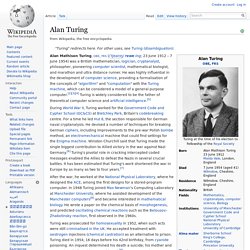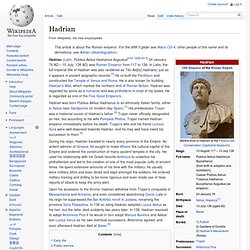

Alan Turing. Alan Mathison Turing, OBE, FRS (/ˈtjʊərɪŋ/ TEWR-ing; 23 June 1912 – 7 June 1954) was a British mathematician, logician, cryptanalyst, philosopher, pioneering computer scientist, mathematical biologist, and marathon and ultra distance runner.

He was highly influential in the development of computer science, providing a formalisation of the concepts of "algorithm" and "computation" with the Turing machine, which can be considered a model of a general purpose computer.[2][3][4] Turing is widely considered to be the father of theoretical computer science and artificial intelligence.[5] During World War II, Turing worked for the Government Code and Cypher School (GC&CS) at Bletchley Park, Britain's codebreaking centre.
For a time he led Hut 8, the section responsible for German naval cryptanalysis. After the war, he worked at the National Physical Laboratory, where he designed the ACE, among the first designs for a stored-program computer. Early life and career[edit] D r i e s s e n s & v e r s t a p p e n. The C Book. Hadrian. Hadrian (Latin: Publius Aelius Hadrianus Augustus[note 1][2][note 2] 24 January, 76 AD – 10 July, 138 AD) was Roman Emperor from 117 to 138.

In Latin, the full imperial title of Hadrian was also rendered as Tito Ael[io] Hadriano, just as it appears in ancient epigraphic records.[3] He re-built the Pantheon and constructed the Temple of Venus and Roma. He is also known for building Hadrian's Wall, which marked the northern limit of Roman Britain. Hadrian was regarded by some as a humanist and was philhellene in most of his tastes. He is regarded as one of the Five Good Emperors. Hadrian was born Publius Aelius Hadrianus to an ethnically Italian family, either in Italica near Santiponce (in modern-day Spain).[1] His predecessor Trajan was a maternal cousin of Hadrian's father.[4] Trajan never officially designated an heir, but according to his wife Pompeia Plotina, Trajan named Hadrian emperor immediately before his death.
Early life[edit] Public service[edit] Emperor (117)[edit] Artificial intelligence. AI research is highly technical and specialized, and is deeply divided into subfields that often fail to communicate with each other.[5] Some of the division is due to social and cultural factors: subfields have grown up around particular institutions and the work of individual researchers.

AI research is also divided by several technical issues. Some subfields focus on the solution of specific problems. Others focus on one of several possible approaches or on the use of a particular tool or towards the accomplishment of particular applications. The central problems (or goals) of AI research include reasoning, knowledge, planning, learning, natural language processing (communication), perception and the ability to move and manipulate objects.[6] General intelligence is still among the field's long-term goals.[7] Currently popular approaches include statistical methods, computational intelligence and traditional symbolic AI.
History[edit] Research[edit] Goals[edit] Planning[edit] Logic-based.